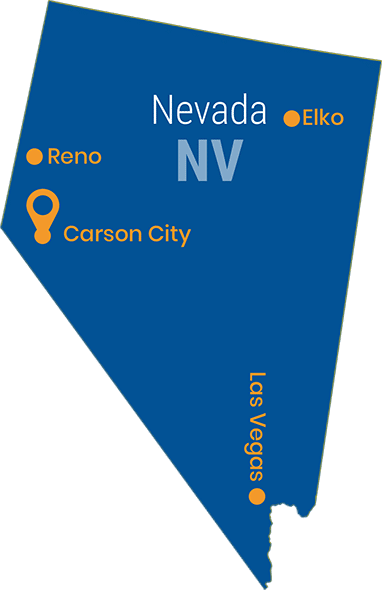What Career Options are Available for Finance Majors?
Nevada may be best known for one of its largest cities, Las Vegas. In fact, that city's entertainment, recreation, and hospitality sector leads the state's revenue generators with a whopping $28 billion in annual funds. This activity puts Nevada in the nation's #6 spot for that economic super-sector. Interestingly, much of that activity can be attributed to the Las Vegas Strip, four miles of road that are home to some of the biggest and best hotels and casinos in the world. However, Nevada has other economic strengths in other sectors, and towns.
A finance professional is a businessperson who focuses their work on the flow of cash, debt, and assets in an institution or other system. They are purely concerned with money and pay less attention on matters such as product development, operations, or human resources. They can find work with any type of business or government agency.
We most often associate finance with banking and investing, but that's not always the case. Finance experts can help a manufacturing concern manage their investments in real estate, capital improvements, and stocks. They can also work as investment bankers who help firms merge with or acquire other firms. Finance professionals typically wear formal business attire daily, work in office buildings, and spend a great deal of time analyzing spreadsheets and other data.

Featured Online Programs
Top Ranked Campus & Online Finance Programs in Nevada
University of Nevada-Reno
Score: 85
- Undergraduate Tuition
- In-State: $8,994
- Out-of-State:$25,950
- Net Price: $16,801
- Acceptance Rate: 85%
- Retention Rate: 80%
- Graduation Rate: 62%
- Total Enrollment: 21,778
- Undergrad Students: 17,965
- Graduate Students: 3,813
- Grads Salary: $73,000
- Student-to-faculty: 16:1
University of Nevada-Las Vegas
Score: 82.78
- Undergraduate Tuition
- In-State: $9,142
- Out-of-State:$26,098
- Net Price: $11,388
- Acceptance Rate: 96%
- Retention Rate: 78%
- Graduation Rate: 50%
- Total Enrollment: 31,094
- Undergrad Students: 25,794
- Graduate Students: 5,300
- Grads Salary: $73,000
- Student-to-faculty: 18:1
College of Southern Nevada
Score: 62.27
- Undergraduate Tuition
- In-State: $4,110
- Out-of-State:$12,209
- Net Price: $7,293
- Acceptance Rate: 100%
- Retention Rate: 79%
- Graduation Rate: 18%
- Total Enrollment: 29,081
- Undergrad Students: 29,081
- Graduate Students: N/A
- Grads Salary: $55,000
- Student-to-faculty: 21:1
Western Nevada College
Score: 45.48
- Undergraduate Tuition
- In-State: $3,920
- Out-of-State:$12,019
- Net Price: $15,793
- Acceptance Rate: 100%
- Retention Rate: 57%
- Graduation Rate: 37%
- Total Enrollment: 4,188
- Undergrad Students: 4,188
- Graduate Students: N/A
- Grads Salary: $34,400
- Student-to-faculty: 18:1
Online Finance Education in Nevada
The second strongest economic sector in Nevada is real estate. Much of this is likely tied to the hustle and bustle of Las Vegas' real estate industry, which is fueled by high rollers who like to buy condos for weekend getaways and large companies turning their land holdings into profit. Nevertheless, Nevada's $25 billion real estate sector is 27th in the nation, followed closely by the professional and business services sector. Professional and business services include waste management, commercial laboratory services, and consulting. Nevada reaps $19 billion in annual revenue from this area.
Indeed, businesses that have the industrial classification, finance, and insurance bring over $9 billion into Nevada's economy every year. This is the 33rd largest finance and insurance sector in the nation. Further, most of Nevada's other top industries, such as manufacturing, wholesale trade, healthcare, and transportation, also need financial services or finance professionals among their ranks.
For that reason, Nevada's legislature works to provide funds to support the state's colleges and universities to create the professionals the state needs. They provide a budget that helps all programs, but they know that finance degree programs are of vital importance to the state. All parts of the state economy need a continuing flow of fresh financial minds who are armed with the best knowledge of finance.
Nevada's business and finance faculties, therefore, seek to use the state's funds to find the very best financial minds academia has to offer. They recruit fresh PhDs, seasoned adjunct professors, and even hardworking financial minds from the local economy. The academics are vital to long-term success of any finance department because they are steeped in the most current scholarly research into financial markets. However, when a department finds a financial genius in the local economy who happens to have a master's degree, they seek them to teach their undergraduate courses. When a working financial professional enters a college classroom, they can inspire students with anecdotes from the local economy. For instance, a finance professional with experience working with hotels and casinos may be able to illustrate how various local regulations impact the flow of cash in those businesses.
Finance is a broad industry that certainly requires a degree. Though there are some certifications that only require successful passage of an exam, to pass that exam most candidates rely on knowledge from a college degree program. Such certification requirements are the minority in the finance field, but many professions have de facto requirements. For instance, investment banking requires a bachelor’s degree for its two-year analysts. Then, an MBA is required to advance into a position as an associate.
While many finance jobs don't have strict regulatory requirements for applicants, employers typically want to see a degree before they make a new hire. Banks and insurance institutions tend to look for a bachelor’s degree, though some jobs may only require an associate degree. There may be jobs that don't need a college degree, but those positions tend to be entry-level and may not offer the same advancement potential, unless the worker earns a degree.
Online Associates (AS)

An associate finance program is a terrific way to get a start in the world of business. An associate degree will help a student land an entry-level position with a bank or perhaps in the finance department of a local company. Insurers may hire candidates with an associate degree for positions in claims processing or underwriting. Those with strong accounting skills may be able to start work as a bookkeeper. Knowledge of finance and financial management will be valued by most any employer for their managerial or other professional positions.
Since associate degrees require that students complete the core college curriculum, they are a strong foundation for those who want to complete a bachelor’s degree. Those core classes may sometimes seem like a nuisance, but they help students gain soft skills such as critical thinking, problem solving, and written communication. Such skills help students stand out in the workplace and may help them earn raises and promotions.
Online Bachelors (BS or B.Fin)

Finance and financial management careers take off from the foundation of bachelor’s finance degrees. Employers prefer to see candidates who have delved deep into the incredibly complex world of finance and have special knowledge and skills to bring to their position. Bachelor’s degrees also offer students ample opportunity to explore related fields that can inform their work life for years to come.
For instance, a bachelor’s finance program student who takes a minor concentration in computer science may be able to work with large data sets using self-written computer code. Others who enhance their finance courses with high-level mathematics may also be able to perform financial analysis at a higher level than those who don't take such courses. Economics is also a terrific adjunct to a financial management degree, providing students with a bigger picture view of their business and how fiscal matters affect everything.
Find Your Online Finance Program
Online Masters (MS or M.Fin)

The world of finance highly rewards those who earn a master's degree. In fact, many financial management students consider a master's with a finance major a requirement for career success. There are even accelerated master's finance degree programs that help students work through their undergraduate and graduate finance degrees in a single program. Those accelerated programs take five years and are very intensive. However, students can save money and time by consolidating their degrees in this way. Courses in a finance major, such as financial management, at this level may include courses in corporate finance, business administration, portfolio management, data analysis for business decisions, etc.
Another option is a Master's of Business Administration (MBA) with a concentration in finance. In fact, most financial management students who seek a master's degree will choose an MBA. This is because the first year of an MBA provides a master's level, general business administration education. The second year requires a concentration, and finance is a popular option.
Students can also choose a dual MBA that pairs another graduate degree with the business training. Finance students may choose an MS in finance, or they may opt for a program such as computer science, data science, law, or economics.
Online Doctorate (PhD)
Though finance is a very intellectually rigorous field, most businesses aren't as interested in a PhD candidate as they are in an MBA or other graduate study. However, the degree is still worth pursuing for those who have specific career goals. One such goal is in academia.
Finance students who earn a PhD can seek a tenure track position teaching finance to graduate or undergraduate students. They may also find a position as a research faculty member. Research faculty spend their time researching and writing about various topics for the people or entities who offer their institution grant money. Research faculty may have graduate students assist them but most work independently.
A PhD is also a great background for someone who is seeking to start a consulting firm, or work for a think tank organization. Consultants who have top academic credentials attract attention from clients who want an assurance that they are being advised by the best minds in the business.
Become a Finance Professional in Nevada
Nevada's economy is led by hospitality, entertainment, arts, and gaming. Many students in Nevada who wish to pursue finance may not immediately see that as a possible career path. The glitz and glamour (and big bucks) in Vegas may obscure the fact that behind every hotel reservation or desert water fountain is a finance professional who ensures that every aspect of the Vegas strip is a profit generating element. However, these students still need to learn how to become a finance professional in Nevada.
One of the first steps to success in finance is a solid education. Since finance relies almost exclusively on number crunching, students are advised to knuckle down into their mathematics courses. This can start as early as high school. High schoolers should strive to take the highest mathematics course possible, often Calculus I, as well as any complementary electives. If their school offers any accounting or economics courses, those would be great additions to an education.
Another important focus area for budding finance majors is computer programming and computer science. Students should start working with a spreadsheet program as soon as they are able. They may be able to start programming macros that will help with their math homework, or they could design a spreadsheet that will help their family with their budget.
When it comes time to find a college or university, students will naturally want to find the very best finance degree programs, including an online degree in finance, if they can find one. One easy way to assess which finance department is the best is by evaluating their accreditation. Students should first make sure that any school holds CHEA-approved regional accreditation. Then, finance students should discover whether their department has program specific credentials. For business related programs, accreditation from AACSB, ACBSP, or IACBE indicates the highest quality.
Students who are aiming for a C-suite job should start looking for the best graduate degree program as soon as possible. The same accreditation stipulations from undergraduate programs apply, but students should also confirm that they can either conjoin an MS in finance with their MBA or that the program offers finance as a concentration.
Potential Careers for Finance Graduates
This is one of the most highly esteemed business professions. Public accountants hold state licensure, they are qualified to sign tax return documents, and they are experts at auditing a firm's financial dealings. To become a public accountant, candidates must pass all four parts of the certified public accounting examination, one of the most difficult professional exams.
- Financial Managers
These professionals typically work for a firm that is concerned with some other line of business. In Nevada, for instance, a hotel or casino may have a financial manager who oversees the hotels, investments, and cash flow. Financial managers may also work to help wealthy individuals manage their funds. - Claims Adjusters, Examiners, and Investigators
Insurance companies need claims adjusters, examiners, and investigators to ensure that all claims against their policies are valid. Claims adjusters evaluate the value of a wrecked car, for instance, and determine how much should be paid to repair or replace it. Claims investigators investigate claims that may be fraudulent and thus a drain on the institutions finances. - Budget Analysts
These financial wizards review various projects or business activities and determine how much money should be allocated to it. Budget analysts must take all the relevant variables into consideration. They review a budget proposal against the available funds and may recommend that certain elements be altered or eliminated. - Financial and Investment Analysts
Analysts review the value of a company or other entity to determine its value as an investment. Analysts may compile lists of comparable companies to determine their relative value. In the world of investment banking, analysts often work for two years putting in long hours of hard work. After their two-year program ends, they earn an MBA and can return to the industry as an associate. - Personal Financial Advisors
These financial experts must work with a license to call themselves financial advisors. Though they can work with any sort of client, most work with wealthy individuals who want to maintain and grow their wealth. They may also work with entities such as colleges and universities who need to manage their endowments. - Credit Counselors
Companies and individuals who need a loan may need to consult with credit counselors. These consultants can help straighten out their client's finances so that they can ensure they are and remain credit worthy. They can also conduct credit checks to help determine whether there are mistakes in a credit report. - Investment Banker
This title can cover finance professionals who work with mergers and acquisitions, credit consultants, or private placement experts. Investment bankers can start their careers with a bachelor’s finance degree, but they almost always need to earn an MBA to progress in their career. - Economic Analyst
These business professionals keep a keen eye on the economy and then advise their employers or clients as to upcoming opportunities or dangers. Professional economists must have a master's degree or else demonstrate extraordinary knowledge and skill with a bachelor’s degree. Nevertheless, most employers want to hire those with a master's degree. - Business Administrator
- Accountants
Search All Programs





